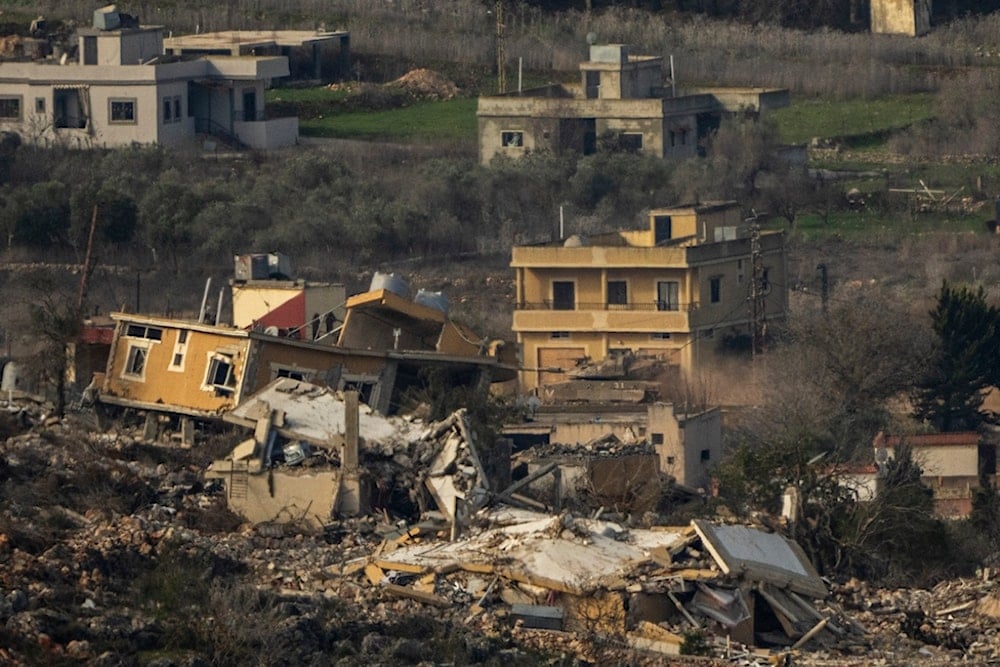'Israel' destroyed 55% of border town during ceasefire: Local official
The delay in the Israeli withdrawal has heightened tensions, with Hezbollah calling on the Lebanese government to exert pressure on international mediators to enforce the ceasefire.
-

An Israeli tank maneuvers inside a village in southern Lebanon, as seen from northern Palestine, Thursday, Jan. 23, 2025 (AP Photo)
The ceasefire agreement between "Israel" and Lebanon, implemented in late November 2024, is facing significant challenges, with continued Israeli shelling reported in Lebanon's southern border areas. Abd El Menem Shukair, head of the Meiss El Jabal municipality, described the extensive destruction in the region during an interview with RIA Novosti on Friday. He stated that homes and infrastructure in border towns have been heavily damaged despite the ceasefire.
The agreement, part of a US-mediated settlement, mandates that the Lebanese army secure southern territories while Hezbollah withdraws north of the Litani River within 60 days. In return, Israeli forces are required to fully withdraw from Lebanese soil by January 26.
However, Israeli Prime Minister Benjamin Netanyahu confirmed earlier in the day that "Israel" will not meet the withdrawal deadline, claiming that Lebanon has "not yet fully enforced" its obligations under the agreement. Netanyahu cited the Lebanese Army’s incomplete deployment in the south as justification for prolonging "Israel's" presence, adding that the withdrawal process remains in "full coordination with the United States."
Read more: Israeli forces to remain in Lebanon beyond Jan 26 deadline: Netanyahu
Shukair highlighted the devastating impact of ongoing hostilities, particularly in Meiss El Jabal, a town in the Nabatiyeh province. "In Meiss El Jabal [in the Nabatiyeh province] about 55% of the buildings in the town are destroyed: 1,200 buildings completely destroyed, 1,800 damaged, 2,000 housing units destroyed," Shukair said. Essential facilities, including hospitals, schools, and administrative buildings, have been rendered unusable, further discouraging displaced residents from returning.
He also raised concerns about additional risks, including the potential for Israeli forces to plant landmines and cluster bombs in the ruins. White phosphorus bombing has further contaminated agricultural lands and water sources, creating long-term environmental and health hazards for the local population.
Withdrawal Standoff
The delay in the Israeli withdrawal has heightened tensions, with Hezbollah calling on the Lebanese government to exert pressure on international mediators to enforce the ceasefire. In a statement issued Thursday, the group stressed the importance of holding "Israel" accountable for adhering to the agreement, stating that any breach of the deadline would be a violation of Lebanese sovereignty.
"The leaks indicating that the enemy plans to delay its withdrawal and remain in Lebanon for a longer duration require everyone, especially the political authorities in Lebanon, to exert pressure on the countries sponsoring the agreement," Hezbollah said.
Critics have also warned of the consequences of Israel’s continued presence. Jack Neria, an Israeli expert on Lebanese affairs, cautioned that such delays risk reigniting guerrilla warfare with Hezbollah, a scenario reminiscent of the 1982–2000 conflict.
"This will take us back 40 years. Hezbollah's statements [regarding Israeli withdrawal from southern Lebanon] must be taken seriously," he told Israeli Channel 13.

 3 Min Read
3 Min Read








